Iran Nuclear Talks In Vienna Adjourn Friday
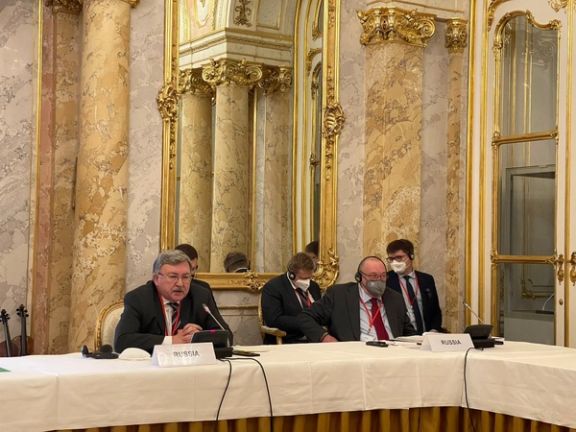
Diplomats negotiating in Vienna over reviving Iran’s 2015 nuclear agreement (JCPOA) will wrap up their first session of talks on Friday with a final meeting.

Diplomats negotiating in Vienna over reviving Iran’s 2015 nuclear agreement (JCPOA) will wrap up their first session of talks on Friday with a final meeting.
European and Iranian officials said they will hold a last formal session before adjourning. The United States is not a direct participant in the talks because it withdrew from the agreement in 2018 and imposed heavy sanctions.
The meeting of Iran, France, Germany, Britain, Russia and China is in a format known as the Joint Commission which has bookended previous rounds of talks. The Iranian official said the meeting would be held around noon (1100 GMT). The aim is to resume the talks next week, the European diplomat said.
On Thursday, Iran submitted two documents to the Commission members outlining its position on removing US sanctions and its own nuclear program. Diplomats said they will study Iran’s proposals.
Both Washington and Tehran sounded pessimistic on Thursday about the outcome of the talks, as each called on the other party to show goodwill.
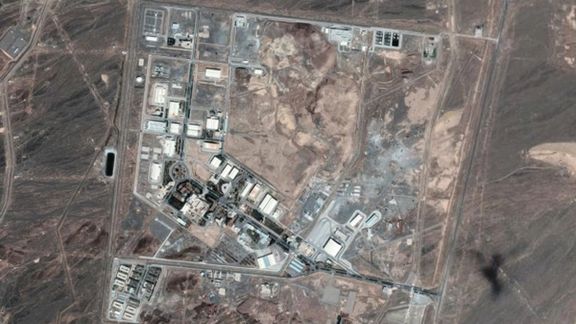
Israel used an Iranian network of agents to conduct sabotage operations against Iran’s nuclear facilities, a new report by The Jewish Chronicle said Thursday.
A large explosion in April that inflicted major damage to the Natanz uranium enrichment site was conducted by recruiting several Iranian scientists working in the complex, the report says. They smuggled explosives into the highly secure facility and at the chosen moment the explosion was triggered remotely.
The Jewish Chronicle (JC) says 90 percent of centrifuge machines enriching uranium were destroyed and the facility was put out of action for nine months. The scientists and people involved in the operation were evacuated from Iran and are in a safe place the report adds.
The Natanz incident rattled the Iranian leadership, because it was so large, they could not hide it, or claim it was a technical accident. The Islamic Republic heavily promotes an image of invincibility to keep control of its restive population and successful sabotage acts damage its image domestically.
Natanz was the target of an earlier attack in July 2020, when a sensitive building for manufacturing new centrifuges blew up. The JC report says that in this operation explosives were imbedded in construction material that Iran bought from Israeli agents and when the time came the Mossad pushed the button.
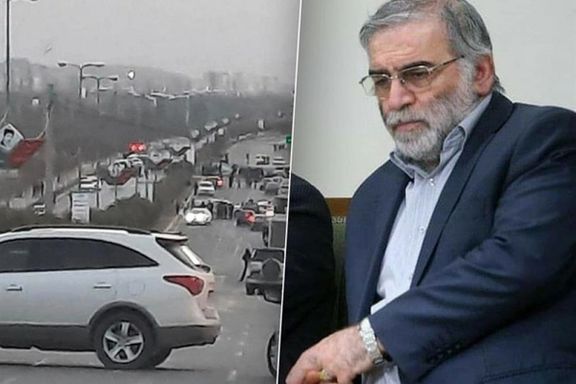
The spectacular assassination of a top Iranian nuclear and military scientist in November 2020 was another sabotage act widely attributed to Israel, when a remotely operated heavy rifle was placed in a van and opened fire at the car of Mohsen Fakhrizadeh, killing him on the spot, despite the presence of a team of bodyguards.
This led to mutual recrimination between security agencies but was particularly embarrassing to the Islamic Revolutionary Guard Corps (IRGC) which had the responsibility to protect Fakhrizadeh.
As the Biden Administration has been trying to revive the Obama-era nuclear agreement with Iran, abandoned by Donald Trump in 2018, Israel has become highly worried that Tehran will get maximum concessions from the US and keep its nuclear program intact. Israeli officials have repeatedly threatened in recent months to use military force if needed to deny Iran a nuclear option.
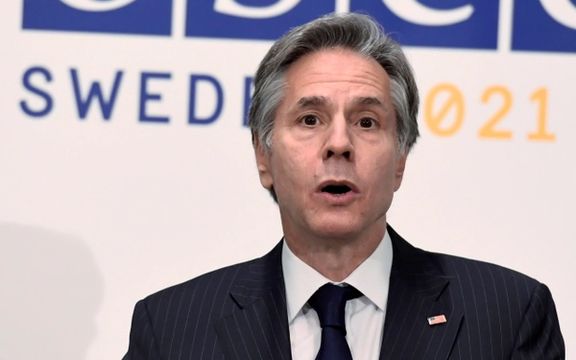
Iran and the United States both signaled pessimism over nuclear talks in Vienna as Tehran presented proposals for reviving its 2015 deal with world powers.
Antony Blinken, US Secretary of State, told reporters in Stockholm, where he is attending the Organization for Security and Cooperation in Europe (OSCE), that “recent moves, recent rhetoric, don’t give us a lot of cause for…optimism.” Blinken put the onus on Iran to “reverse course and engage meaningfully.”
In what might have been a US reaction to new proposals circulated Thursday by Iran to remaining members of the JCPOA (Joint Comprehensive Plan of Action), Blinken said the US would “in the very near future, the next day or so…be in a position to judge whether Iran actually intends now to engage in good faith.”
In Tehran, Hossein Amir-Abdollahian, Iran’s foreign minister, said that “we are not optimistic about the will and intentions of the US and the three European countries.” Amir-Abdollahian was quoted by the official news agency IRNA saying Iran had been encouraged to return to talks over restoring the JCPOA but had nonetheless faced additional US “sanctions on individuals and entities.”
The foreign minister, quoted after a meeting with Japanese foreign minister Yoshimasa Hayashi, said Iran had gone to Vienna, where talks resumed this week after a five-month pause, with “serious determinations and a clear, logical agenda.”
The talks in the Austrian capital formally involve remaining JCPOA signatories – China, France, Germany, Iran, Russia, and the United Kingdom – with a US delegation led by special envoy Rob Malley taking part indirectly.
Iran has stressed the importance of lifting ‘maximum pressure’ sanctions, targeting its oil exports and financial sector, imposed by the US after 2018 when former president Donald Trump left the JCPOA, whereas the US has highlighted Iranian nuclear advances since 2019 beyond limits set by the deal.
‘That will not happen’
"What Iran can't do is sustain the status quo of building their nuclear program while dragging their feet on talks,” Blinken said. “That will not happen.”
Iran’s latest breach of the JCPOA, reported by the International Atomic Energy Agency (IAEA) Wednesday, is to begin enriching uranium at its fortified Fordow plant using relatively advanced centrifuges.
Iran’s lead negotiator Ali Bagheri Kani, who earlier Thursday announced Iran had circulated its new proposals, later met IAEA chief Rafael Mariano Grossi, who subsequently tweeted that they had discussed both “current exchanges in the context of the JCPOA negotiations” and “our own bilateral activities.”
The IAEA would have enhanced monitoring powers under a revived JCPOA, and is meanwhile trying to arrange better access after Iran in February limited agency inspections largely to those required under the Nuclear Non-Proliferation treaty.
Grossi told France24 television Wednesday that be believed talks in Vienna were “trying to build on what was going on before” and that he said an agreement was needed “soon.” The talks were suspended in June, with some diplomats suggesting there was 70-80 percent agreement, and there has been speculation as to how far a new Iranian negotiating team, after the election of President Ebrahim Raisi (Raeesi), would shift Iran’s position.
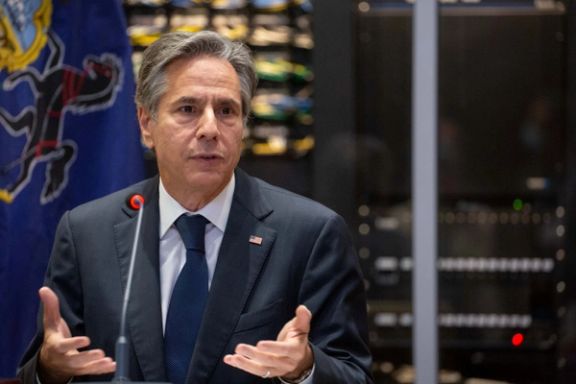
US Secretary of State Antony Blinken Thursday told his Russia counterpart, Sergei Lavrov that the two countries have a shard interest in preventing Iran from obtaining nuclear weapons.
In a meeting of 57 foreign ministers in Stockholm, Sweden, Blinken who was urging cooperation with Russia said, “we have shared interests that we are working on together, including a shared interest in Iran not acquiring a nuclear weapon. Our colleagues are working together in Vienna as the talks proceed.”
Russia is one of six countries who negotiated and signed the 2015 nuclear agreement, the Joint Comprehensive Plan of Action, or JCPOA. The US pulled out of the agreement in 2018, but Russia, China, the United Kingdom, France and Germany who remained in the deal are holding talks with Iran to see if they could revive the agreement.
Russia is Iran’s diplomatic ally and generally backs Tehran’s position in the nuclear dispute, but Russia’s interests in the region also present a complicated picture, as it cultivates good relation with some of Tehran’s regional rivals.
Blinken referred to shared interests on Iran as he was warning Lavrov about Russia taking aggressive action against Ukraine. In recent days, European countries have become alarmed at Russian military moves that could signal action against Ukraine.

Iran has presented two new sets of proposals in the Vienna nuclear talks, its lead negotiator Ali Bagheri Kani told Iranian news agencies Thursday.
Bagheri Kani said these could alter whatever was agreed before talks were suspended in June. “There is a new government in Iran, and a new negotiating team,” he said. “We need changes in the text.”
After four months of talks earlier this year, diplomats suggested there was 70-80 percent agreement over renewing Iran’s 2015 nuclear agreement with world powers, the JCPOA (Joint Comprehensive Plan of Action), which the United States left in 2018. The talks formally involve remaining JCPOA signatories – China, France, Germany, Iran, Russia and the United Kingdom – with the US taking part indirectly.
Bagheri Kani said that whatever was agreed previously had been a “draft” and that there was “no doubt” it was open to renegotiation.
Iran’ new proposals, he said, covering both sanctions and Tehran’s nuclear program had been circulated in writing to all JCPOA members. A European diplomat in Vienna confirmed to Reuters that draft documents had been received.
Bagheri Kani said he had already fielded questions, referring apparently to meetings with Enrique Mora, the senior European Union official chairing the talks, and the Russian delegation. The Iranian diplomat said there was a need for “new negotiations about these documents.”
Bagheri Kani gave no indication as to what precise proposals were in the Iranian texts. Talks before April struggled to agree precisely which US sanctions violate the JCPOA and exactly how the Iranian nuclear program, expanded and enhanced since 2019, should be brought back to limits set by the JCPOA.
Bagheri Kani stressed the “international dimension” of the talks. He said that “players outside the direct theatre” were “trying to create diversions and disruptions in the nuclear talks.” It was not clear whether he was referring to the US, or to Israel, which has made a range of recent accusations over Iran’s nuclear program and, after Wednesday’s International Atomic Energy Agency report highlighting Iran’s use of advanced centrifuges at its Fordow enrichment plant, called on world powers to leave Vienna.
With Thursday the fourth day of what are the seventh round of talks, Bagheri Kani said the Iranian delegation was ready to stay in Vienna as long as was necessary, but that other delegations might prefer to return to their capitals for consultation over the new Iranian texts.
“Of course, the other side can express their opinions about these changes,” Bagheri Kani said. “Many have been saying Iran is not serious and doesn’t want to talk and reach results. These proposals show Iran is serious.”

Israel on Thursday called on world powers to halt nuclear talks with Iran immediately, citing a UN watchdog's report that Tehran has started enriching uranium with more advanced centrifuges.
"Iran is carrying out nuclear blackmail as a negotiating tactic, and this should be answered by the immediate halt to negotiations and the implementation of tough steps by the world powers," Prime Minister Naftali Bennett's office quoted him as saying in a call with US Secretary of State Antony Blinken.
The International Atomic Energy Agency (IAEA) announced Wednesday that Iran has started enrichment up to 20 percent at Ferdow with one cascade, or cluster, of 166 advanced IR-6 machines. The agency said Iran had also installed but was not yet operating another 94 IR-6 machines in a cascade at Fordow.
Tehran has accelerated higher degree of uranium enrichment this year, after its parliament passed a law in December 2020 demanding US lift economic sanctions. Uranium is being enriched to 20 and 60 percent purity and Iran has accumulated more than 200 kg of fissile material that could enable it to produce a nuclear weapon in a matter of weeks.
With reporting by Reuters